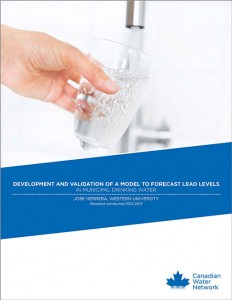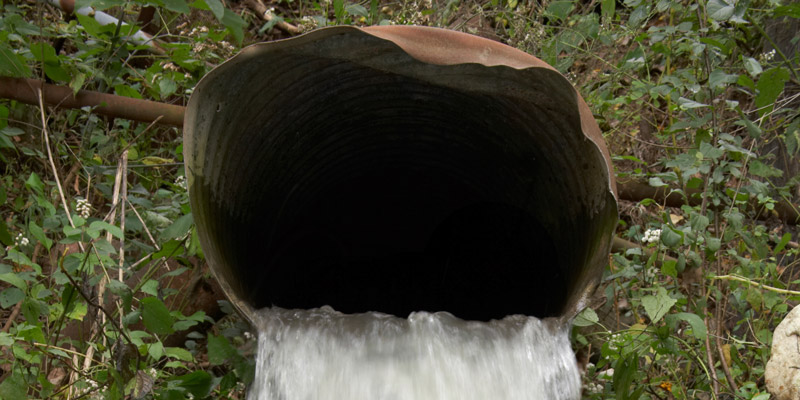Development and Validation of a Model to Forecast Lead Levels in Municipal Drinking Water
Principal Investigator - Jose Herrera, Associate Professor, Western University, 2012 - 2014

Challenge
Dissolved lead in drinking water is a major public health concern for Canadian communities still serviced by lead pipes. The main source of dissolved lead in drinking water is caused when corrosion scale formed on the inner surfaces of lead pipes becomes destabilized. Mechanical disturbance of lead scale, due to changes in flow and galvanic dissolution (galvanic dissolution occurs when more than one building material is being used to construct the pipe; dissimilar metals have different electrode potential causing them to dissolve at different rates), are also contributing factors. The dissolution of lead in drinking water due to these processes eventually result in lead concentrations above regulatory limits.
Municipalities require feasible mitigation strategies for controlling the release of dissolved lead in drinking water, and as such, require a clear understanding of the interrelationships of source water chemistry, treated water quality parameters, treatment options, and chemical reactions taking place within water distribution infrastructure.
This project, led by Dr. Jose Herrera, examines the interrelationships of source water chemistry, treated water quality parameters, treatment options, and chemical reactions occurring within water distribution infrastructure that cause the destabilization of corrosion scale. Additionally, this project develops a numerical model to predict lead dissolution in water distribution systems.
Project
This research program assesses the variables that control lead corrosion in water systems and will apply understanding gained to develop a model to predict lead dissolution in water distribution systems. To do this, field data will be collected by partner Canadian municipalities and from pipe loop systems with lead plumbing obtained from partner communities. This will involve collecting and characterizing solid lead corrosion scales from lead pipes in communities with different water quality characteristics and conducting continuous pipe loop dissolution experiments. Data will also be collected from home studies in the distribution systems of these municipalities. This data will be used to develop and validate the numerical lead dissolution model developed by the project team. If possible, data related to the impact of other variables on lead dissolution collected by other researchers (not involved with this project) will be incorporated/used to validate the model.
Researchers anticipate that when this project is complete, the model will also be capable of simulating long-term solid phase transformations in the corrosion scale due to changes in the water chemistry. This understanding is essential not only from a strictly scientific point of view, but also for drinking water operators as it is needed to evaluate the long-term effectiveness of a corrosion control strategy.
Outputs
Anticipated outputs include:
- Modeling tool developed which will be available and widely disseminated to water quality managers, water supply operators, and other decision makers in Canada interested in the research outcomes.
- To facilitate the use and application of the numercial model, a simple, user-friendly Windows® interface tool will be developed to enable the numerical lead dissolution model to be used by non-expert modellers (e.g., municipal water engineers).
This tool will enable users to specify their exisitng or anticipated water/solid scale properties and thus, ensure that the water entering their distribution system has the characteristics required to avoid destabilization of inner pipe lead scale.
Outcomes
Anticipated outcomes include:
- The proposed numercial model will be employed as a decision-support and sensitivity analysis tool by municipalities to analyze the effectiveness of their water treatment system.
- Informed investments: The use of the modeling tool by Ontario municipalities will result in a significant long-term reduction of analytical expenditures. It is expected to reduce the number of samples required to test for lead levels by 50%.
- Assist decision-making: The research findings will assist Canadian municipalities with the prioritization of replacement of the lead pipe infrastructure.
- The results of this project will expand the successful research of a previous study with City of London that evaluated the surface structure and composition of the lead corrosion scale present in London’s drinking water pipes, which enabled the City of London engineers to develop a strategy to modify water quality parameters to minimize lead corrosion.
- Additionally, this research has helped establish strong partnerships with Ottawa and Toronto municipalities. Researchers are currently exploring additional areas of common interest for future project collaboration with all partners.





